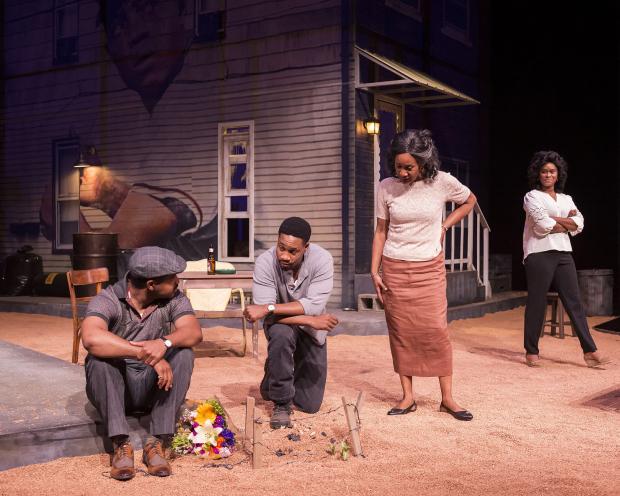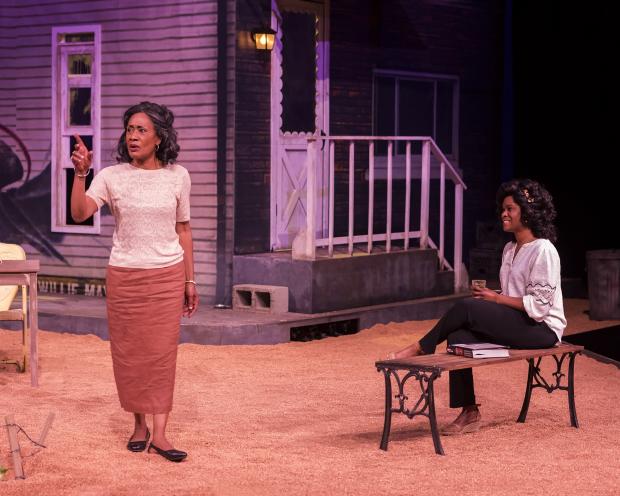A Noise Within’s gripping production of August Wilson’s King Hedley II is a brutal, harrowing odyssey into what W.E.B. Du Bois called “the soul of Black folks.” The drama is part of Wilson’s epic exploration of African American life consisting of ten plays set in the Hill District of Pittsburgh (except for Ma Rainey’s Black Bottom), where the award-winning playwright grew up. Wilson’s remarkable decology is known as the “American Century Cycle” and/or as the “Pittsburgh Cycle.” Each one of the plays is set in the 20th century during a different decade; for instance, Fences takes place in 1957 in that Pennsylvanian city.
Although it’s never explicitly stated, via a timeline mentioned in passing in King Hedley II, this two-act tragedy with an intermission takes place during the 1980s. Reactionaries may ballyhoo the Reagan Era as a time of “morning in America,” but abroad it was a period of “mourning in Central America,” for thousands butchered by U.S.-backed, armed, and financed (in part, courtesy of weapon’s sales to Iran) death squads and contras in El Salvador, Nicaragua, etc. Domestically, the mass murderer Reagan brought the war home by decimating the safety net and devastating unions such as the air traffic controllers.
Without ever mentioning Reagan, Wilson deftly dramatizes how Reaganomics wreaked havoc on African Americans. Of course, Reagan didn’t discover and originate racism but after the gains of the Civil Rights and Black Power movements, he systematically set about reversing what advances had been made. Shortly after the curtain lifts, the play’s titular character (Aaron Jennings) has returned to Pittsburgh after serving time in prison for killing a man who had slashed him across the cheek with a blade. King’s scar (wrought by makeup designed Shelia Dorn) is so pronounced that, even though I was sitting in the front row, I initially thought it was part of a headset.
Along with his friend simply called Mister (Christian Henley), imbued with the entrepreneurial spirit espoused by acolytes of Reaganomics (such as Gen. Pinochet’s pal free market fanatic Milton Friedman), King dreams of opening up a video store, which Mister and King hope to expand into a chain. Of course, in retrospect, we know now what a chimera that would have turned out to be as VHS cassettes were soon doomed to obsolescence by new technical innovations. Not only that, but the type of films they want to specialize in – martial arts movies – reveals dubious taste (or lack of). But as is your humble scribe’s wont, I digress.
To raise the needed capital, King and Mister turn to crime, because conventional financing avenues such as banks are presumably unavailable to them, so they become hustlers. As is the elegantly attired (by costume designer Mylette Nora) Elmore (Ben Cain), who shows up to woo King’s mother, Ruby (Veralyn Jones), a onetime crooner who has seen better days. Cain’s depiction of the dapper Elmore reminded me of Sammy Davis’ cocaine-dealing smooth operator Sportin’ Life in Otto Preminger’s 1959 screen adaptation of the Gershwins’ opera Porgy and Bess.
In an allusion to the Reagan regime’s whittling away of the welfare state, waiting to receive benefits 62-year-old Ruby is forced to live in the same house (the stellar set is designed by Efren Delgadillo Jr.) with King and his wife Tonya (Kacie Rogers), as there’s a long waiting line to access state housing. The cast’s sixth member is Stool Pigeon (which is ironic, as it’s another one of the dramatis personae who becomes an informer of sorts), a scripture-spouting character cut in the cloth of the griot and “magical Negro” archetypes, prone to exclaiming profundities such as: “God is a motherfucker!” This dreadlocked soothsayer is slyly, whimsically played by Gerald Rivers, who in addition to being a regular member of Will Geer’s Theatricum Botanicum’s Topanga troupe, is renowned for his uncanny reenactment of Reverend Martin Luther King. (It was bittersweet to see Rivers in King Hedley II’s premiere only a couple of days after the anniversary of MLK’s assassination…)
The set includes a yard filled with hardscrabble dirt wherein King symbolically nurtures a plant to grow. He becomes so obsessively proud and protective of the green shoots that he puts barbed wire around it so no one steps on his creation. This is counterpointed to 35-year-old Tonya’s pragmatic decision to terminate her pregnancy, which King opposes, as his wife insists on her bodily autonomy. Especially as she’s uncertain as to whether or not her errant husband will leave her lonely again by being returned to the slammer.
Tonya is arguably the best of King Hedley II’s characters, as she is the only one actively working to rise above her circumstances (without resorting to nefarious methods, that is). She is seen repeatedly studying to get her GED and is in the tradition of the striver. The others, in comparison, turn to crime or to God (which, by the way, is just an illusion that doesn’t exist – except in the imaginations of desperate deluded humans – pass the plate!). Ruby once sang with a big band but failed as a singer. Only Tonya is really trying to improve herself in a realistic, legitimate way.
King Hedley II dramatizes the dire socioeconomic realities of Reaganism for many African Americans. Like rappers fixated on bling, King is under the spell of money. When he offers Tonya $500 she declines; King is mystified by his wife’s refusal based on her (well-founded) suspicion that these were ill-gotten gains. Stupefied, King insists that it doesn’t matter where money comes from or how it is attained – money is money, and in Reagan’s America, money doesn’t just talk: It screams. But for the ethical Tonya, how one derives those greenbacks does indeed matter.
Most of King Hedley II’s characters are also prisoners of crazy codes of “honor” and behavior and they remain prisoners of their circumstances. The sextet of African Americans realize that they are unjustly discriminated against because they are Black, but beyond this sense of victimhood at the hands of systemic racism, they have no political consciousness per se. There is no sense of collectively organizing in order to overcome the injustices they are subjected to, in the vein of the Civil Rights, Black Power, BLM movements, et al. No “power to the people!” rabblerousers here. This play’s players are powerless, without any agency – an extremely dangerous, reactionary message, especially in these fraught times as the fascist threat posed by the MAGA maggots casts its gruesome shadow over America. I couldn’t but ponder whether Wilson had named the eponymous character as an ironic reference to Dr. King. Inquiring minds want to know…)
August Wilson earned Pulitzer Prizes, a Tony Award and other well-deserved accolades and as said, is writing about a social milieu he grew up in and was intimately familiar with. This gifted bard certainly knew much more about Black people than this Caucasian critic ever could, but if one views King Hedley II as a one-off production and not as a part of the ecology of Wilson’s decology, viewers can cynically see his characters as being stage stereotypes of African Americans as criminals who have parentage of dubious provenance, plus as being bible-thumpers. The same ol’ age-old, trite tropes.
Having said that, director Gregg T. Daniel certainly admirably helms his cast, with all six thesps delivering taut, tense depictions that embody the African American experience – or at least a slice of it. If finely etched acting in a powerful, pull-no-punches drama is your thang as a theatergoer, you won’t go astray with ANW’s rendition of the august August Wilson’s next-to-last play in his ten-part epic – message be goddamned. After all, as Stool Pigeon repeatedly points out: “God is a motherfucker!” (Even if he/she/it doesn’t exist.)
King Hedley II is being mounted through April 28 on Thursdays at 7:30 p.m. (dark April 18); Fridays at 8:00 p.m.; Saturdays at 2:00 p.m. and 8:00 p.m. (no 8:00 p.m. April 27); and Sundays at 2:00 p.m. The performance on Thursday, April 11 is “Black Out Night,” an opportunity for an audience self-identifying as Black to experience the performance together; tickets include a post-show reception; non-Black-identifying patrons are welcome to attend, or to select a different performance. Post-performance conversations with the artists take place every Friday and on Sunday, April 14. A Noise Within is at 3352 E. Foothill Blvd., Pasadena, CA 91107. For info: (626) 353-3100 or www.anoisewithin.org.





